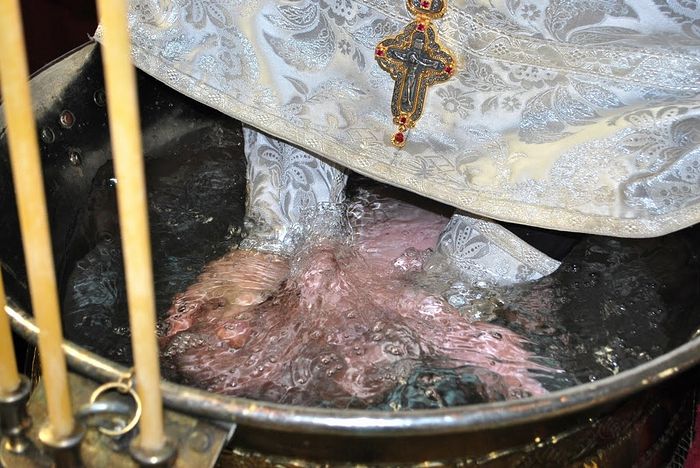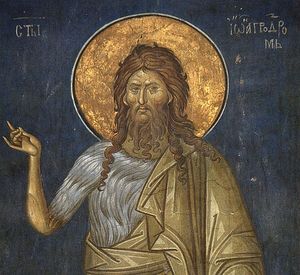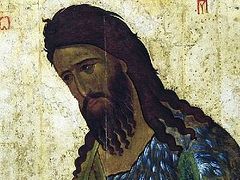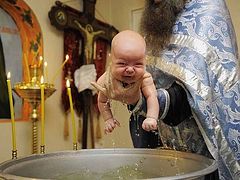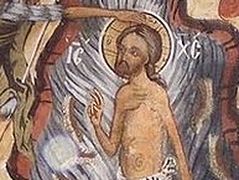January 20, in the afterfeast of Theophany (the Baptism of the Lord), the Orthodox Church honors the one who (as it says in the canon dedicated to him) “wast found worthy to touch the head of Christ the King,” and of whom the Savior Himself said in the Gospel: Among those that are born of women there is not a greater prophet than John the Baptist (Lk. 7:28). On this day, the apodosis of the Theophany, we would like once again to remember the great Forerunner of Christ.
The day after Theophany is called the Synaxis of the Prophet, Forerunner and Baptist of the Lord John. Synaxis—because conciliarly, unanimously, and of one heart we gather in church to render worthy praise to this great God-pleaser, who directly took part in the Baptism of the Lord in the thirtieth year of the first century of the Nativity of Christ in the southern tip of the Jordan River’s flow, in the area known as Vifavar. Precisely before him the heavens were sundered, and like the righteous Abraham of the Old Testament, he beheld the Holy Trinity.
The voice of John the Baptist sounds forth from the pages of the Holy Gospel, down through the ages for us, and the main message in his words is, Repent ye: for the kingdom of heaven is at hand (Mt. 3:2). And further: And now also the axe is laid unto the root of the trees: therefore every tree which bringeth not forth good fruit is hewn down, and cast into the fire (Mt. 3:10). And the striking fact here is that the holy Forerunner did not say this from himself, but was under the power of the Holy Spirit. The Gospel speaks directly about this: The word of God came unto John the son of Zacharias in the wilderness (Lk. 3:2).
So, why is repentance so important in man’s life?
In the Greek language, the word “repentance” (“metanoia” “metania”) designates a “change of mind,” a “change of thought,” a “reconsideration,” or “change.”
In the baptismal font during the Mystery of Baptism, by the triple immersion into water by a priest, our old man dies; for the water here is not merely a symbol of ablution and purity, but a symbol of the earth and burial. And by the triple rising from the water, pronouncing the baptismal formula, “The servant of God (name) is baptized in the name of the Father. Amen. And of the Son. Amen. And of the Holy Spirit. Amen,” man arises renewed and heavenly, grafted onto the vine of Christ and cleansed from sin—worthy of the Kingdom of Heaven. After all, it was not only for our Lord Jesus Christ that the heavens were opened during His Baptism, and the Holy Spirit descended upon Him, and the voice of God the father was heard: Thou art my beloved Son; in thee I am well pleased (Lk. 3:22), but for each of us, baptized into Christ and adorned in Christ, the heavens are sundered and upon each of us the Holy Spirit descends, and to each of us speaks God the Father, “Thou art My beloved son (My beloved daughter).” And the great miracle, the great mystery of adoption of every individual person is performed by God.
But in the course of earthly life, every one of falls into earthly ashes; the old man tries to prevail again over the newly-baptized heavenly man in the earthly vale of vanities. As one of the members of the group “Resurrection,” Andrei Sapunov, once sang: “There is coming for me a crazy earthly day. And behind itself it takes me away.” This old man tries to come crawling, like a bug, into the human heart and devour it, that he would live only according to material needs, unto his very end. And then, of course, is Hell—the spiritual death of the immortal soul.
And our task, with God’s help, is to break out of his (the old man’s) tenacious, slimy, lethal embrace: by prayer, participation in the life of the Church, the Sacraments, good works, and, of course, repentance—that is, by a change in ourselves, of our own heart and mental construction. This begins with man turning his spiritual gaze, his attention not upon material, visible, and sensible things that bring carnal pleasure, but within himself, comprehending his own sins, and revealing them, as it says in the prayer of St. Ephraim the Syrian: “O Lord and Master of my life… grant me to see my failings…” And when he will see the abomination in his own heart, this inner filth, which every person inevitably has, then he will understand that he is seriously and gravely ill, that Hell is opening up under his feet, and in one small step is the chasm. And such a person, having recovered his sight (truly!), begins to search for the One Who can heal him. And that, of course, is only God. And in such a person appears a sincere, contrite, correct condition, complicit, like leavened dough, with a fervent desire to unite with the Lord—the only Deliverer from sin. This is called repentance. This is called, Blessed are the poor in spirit: for theirs is the kingdom of heaven (Mt. 5:3).
Such a person hurries to church, hastens to confession, to the priest, to deliver himself from the burden of sins captivating his soul; he hastens to receive within himself the Body and Blood of Christ, to be freed from sins and passions and to unite with his beloved God. This is what the holy Prophet, Forerunner, and Baptist of the Lord John speaks to us about.
Recall, brothers and sisters, his testament: As it is written in the book of the words of Isaiah the prophet, saying, The voice of one crying in the wilderness, Prepare ye the way of the Lord, make his paths straight. Every valley shall be filled, and every mountain and hill shall be brought low; and the crooked shall be made straight, and the rough ways shall be made smooth; And all flesh shall see the salvation of God (Lk. 3:4-6).
Therefore, with the help of God we will, brothers and sisters, vigorously bring low our proud spiritual hills, straighten our passionate, sinful crookedness, and then our heart’s contrite and repentant inner valley will be filled with the grace of the Holy Spirit. And the human flesh (i. e. nature) of each of us shall behold the salvation of God. This is the main work, beyond all doubt, of every Orthodox Christian.
St. John the Baptist will help us in this.
O Holy Prophet, Forerunner, and Baptist of the Lord John, pray unto God for us!

